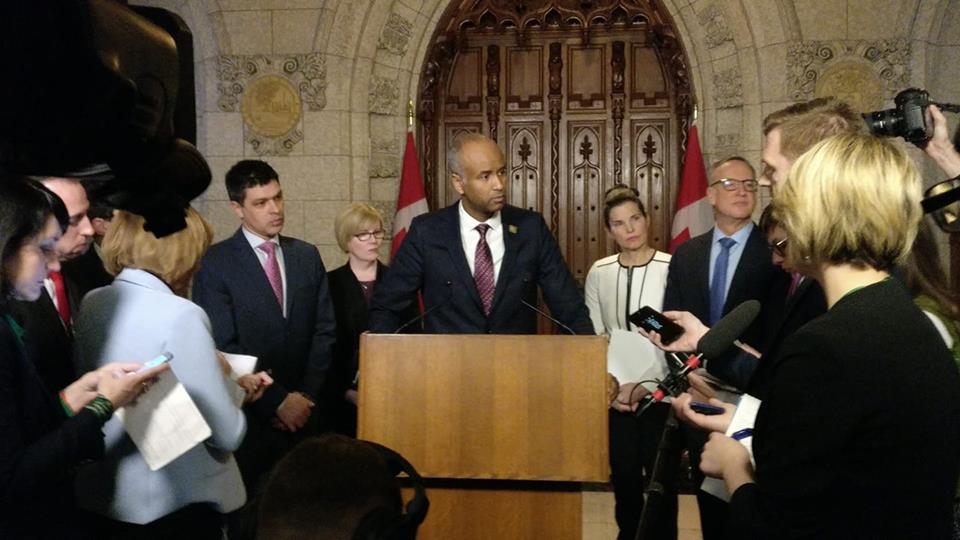Canada News
Ottawa to give $50M to Quebec, Ontario and Manitoba for asylum seeker costs

Immigration Minister Ahmed Hussen says this is not a final payment to these provinces for border crosser costs, but is meant to help address some of the immediate temporary housing needs in those provinces. (Photo: Ahmed Hussen/Facebook)
OTTAWA — The federal government will provide $50 million to Quebec, Ontario and Manitoba to help pay for some of the costs they have borne as a result of the influx of asylum seekers illegally crossing the Canada-U.S. border.
Immigration Minister Ahmed Hussen says this is not a final payment to these provinces for border crosser costs, but is meant to help address some of the immediate temporary housing needs in those provinces.
“The continued influx of asylum seekers entering Canada between ports of entry has increased pressure on provinces to provide shelter and social services to a growing number of asylum seekers,” Hussen said in Ottawa on Friday.
“We appreciate the pressures Quebec, Ontario and Manitoba are facing and will continue discussions with provinces towards longer-term solutions including further financial support.”
Quebec, which has seen the majority of asylum seekers this year arriving through a forest path in Saint-Bernard-de-Lacolle, will receive $36 million. Ontario will get $11 million and Manitoba $3 million.
The provinces have asked for much more, with Quebec saying its costs are closer to $146 million, although this includes projected future costs, Quebec Immigration Minister David Heurtel said earlier this week following meetings in Ottawa.
He responded to the financial announcement Friday on Twitter, saying this marks the first concrete recognition from Ottawa of the considerable impact on Quebec since last year caused by the “massive arrival of irregular asylum seekers.”
Toronto Mayor John Tory says his city is also dealing with strains on housing and overcrowded shelters and by the end of 2018 expects to incur $64.5 million in costs for providing motel housing to refugee claimants. An additional $6.3 million in anticipated costs for emergency contingency sites will also be incurred, Tory said in a statement Friday.
That’s why the $11 million from Ottawa is only “a start towards the federal government meeting its responsibilities to cities,” Tory said.
Hussen says negotiations on further financial compensation with all three provinces are ongoing.
Talks also continue on a plan to “triage” asylum seekers in an effort to move some migrants out of Montreal and Toronto to areas with more available housing and job opportunities.
Last week, the ad hoc intergovernmental task force on irregular migration met to discuss the progress of this plan, but Transport Minister Marc Garneau said nothing can be finalized until the provincial election in Ontario is over.
A reception centre is being set up in Cornwall, Ont., as an alternate location where the federal government can deal with refugee claimants. Now, all federal resources and claims processing centres for irregular migrants are centred in Montreal.
Hussen will soon travel to the United States for high-level talks with U.S. Homeland Security Secretary Kirstjen Nielsen to discuss ideas he has to help modernize the safe third country agreement. They include possibly introducing the use of biometrics to allow border officials to better track the movements of individuals to determine if they are eligible to make a refugee claim in Canada.
But Conservative Immigration critic Michelle Rempel says this would do nothing to address the problem unless Canada and the U.S. agree to close a loophole that exists in the agreement that allows asylum seekers to claim refugee status in Canada if they somehow make it into the country through non-official entry points.
“The safe third county agreement still doesn’t apply at an illegal crossing, so he can biometric all he wants, the agreement still isn’t going to apply unless he broaches the issue of renegotiating it.”
More than 9,000 refugee claimants have crossed into Canada through unofficial paths along the border so far this year, with 90 per cent of them arriving in Quebec.





















